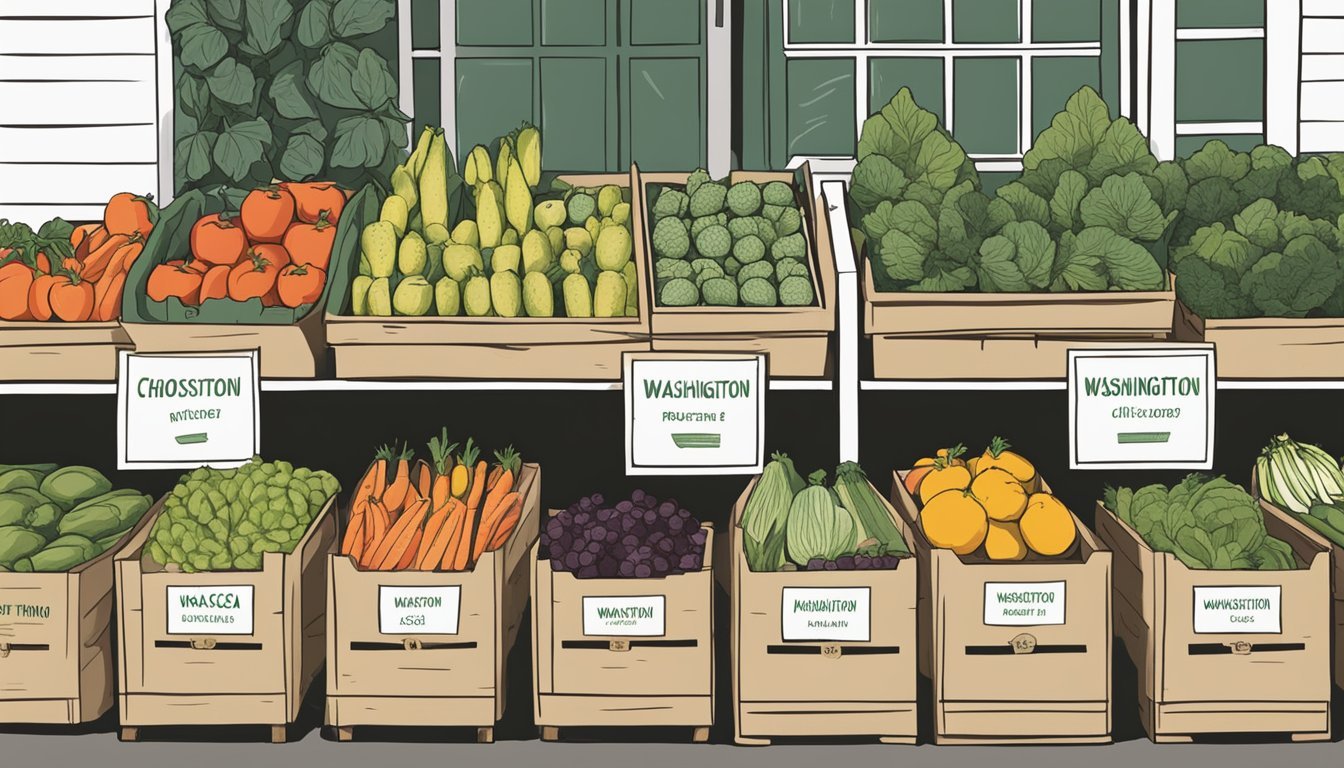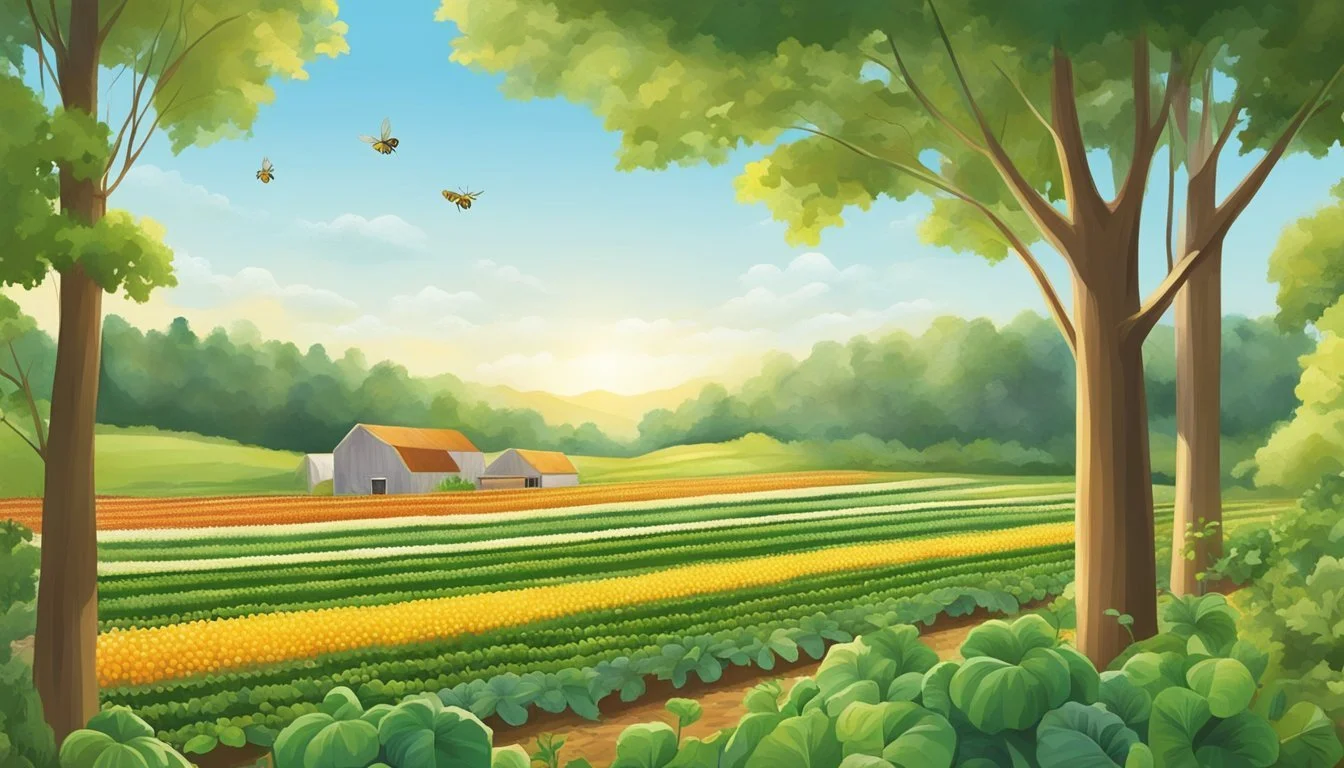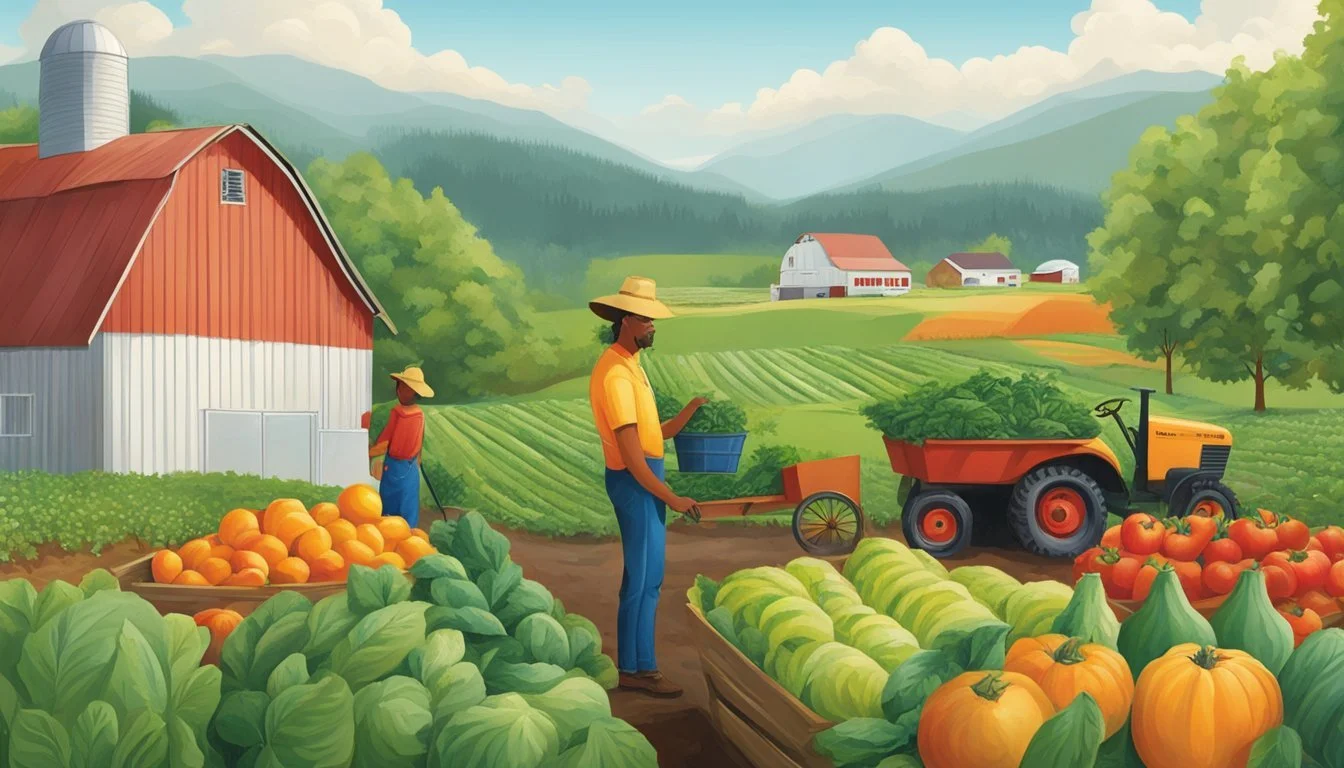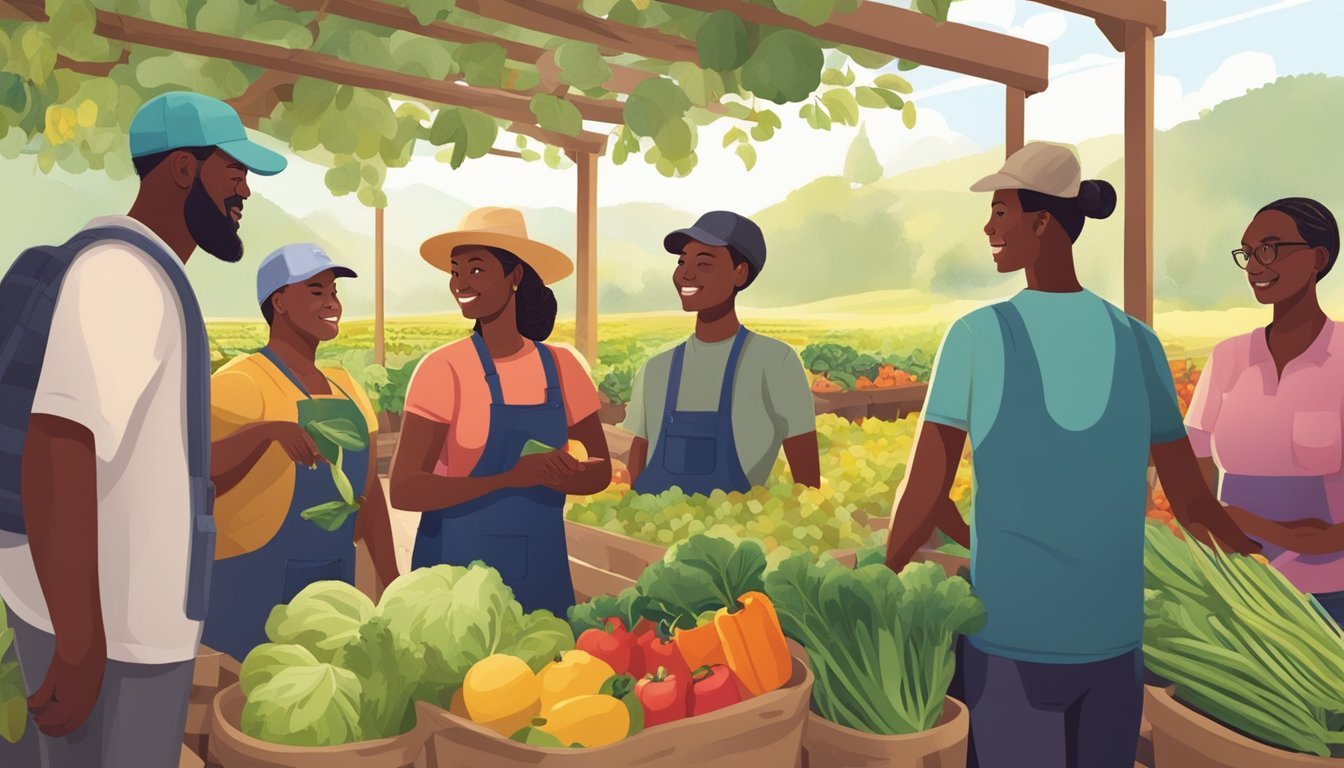Community Supported Agriculture (CSA) in Washington
A Guide to Local Farm Partnerships
Community Supported Agriculture, commonly known as CSA, is a model of food production and distribution that directly connects farmers and consumers in Washington State. In this system, consumers purchase shares of a farm's harvest in advance, providing the farmer with the capital needed to plan for the growing season. As a return on their investment, shareholders receive a regular supply of fresh, locally-grown or raised farm products, such as fruits, vegetables, meats, and dairy. This model not only supports Washington's local economy but also encourages sustainable agriculture practices and a closer connection to the source of one's food.
Washington State offers a diverse array of CSA programs that cater to a variety of tastes and preferences. Consumers can choose from farms specializing in 100% organic produce to those incorporating a more extensive range of locally-grown farm products. CSA members are often provided with the unique opportunity to visit their chosen farms, fostering a deeper understanding and appreciation for the farming process. This farm-to-table approach not only enhances the freshness of the food but also contributes to the local food economy, reducing the carbon footprint associated with long-distance food transportation.
By participating in a CSA in Washington, individuals make a conscious choice to invest in their health, community, and local agriculture. The network of CSA farms across the state is rich and growing, with directories available to help consumers find the farm share that best fits their needs. These farm shares are more than just a means to obtain food; they represent a commitment to preserving the environment, supporting local farmers, and enjoying some of the best produce Washington has to offer.
Benefits of Joining a CSA in Washington
Joining a CSA in Washington State allows members to directly support local farmers while gaining access to fresh, seasonal produce. This partnership promotes a sustainable food system within the Pacific Northwest.
Fostering Local Economies
Participation in a CSA stimulates local economies by funneling funds directly to Washington State farmers. Community members contribute up front, which provides farmers the necessary capital to cover initial production costs. A cycle of financial support for local farms ensues, helping preserve the agricultural heritage and the economic viability of the region's small-scale farms. Washington's CSAs often offer more than vegetables and fruit; they can include a variety of local farm products like meat, eggs, and flowers.
Access to Fresh Produce
Members receive regular shares of freshly harvested produce, which often boasts a higher nutritional value than food shipped over long distances. The diversity of the shares can introduce consumers to new types of vegetables and fruit, enriching their diet with a spectrum of healthy food choices. CSA shares in Washington are reflective of the Pacific Northwest's rich agricultural capacity, providing a bounty that can include anything from crispy apples to lush berries and leafy greens.
Environmental Impact
CSAs in Washington help reduce the carbon footprint associated with food transport and large-scale farming operations. Assisting local farms through CSA memberships supports farming practices that are generally more environmentally conscious and use fewer pesticides compared to industrial farms. Additionally, packaging waste is minimized as the produce requires less transport and handling before reaching the consumer. This local-focused approach is a significant step in creating a sustainable environmental food model within the Washington community.
How CSAs Work
Community Supported Agriculture (CSA) in Washington allows individuals to subscribe to a season of produce from local farms. This model promotes a direct relationship between farmers and consumers.
Membership and Subscriptions
Consumers interested in joining a CSA begin by purchasing a membership. This subscription typically involves a sign-up process where individuals can select the type of share they desire, which indicates the quantity and variety of produce they will receive. Membership often requires choosing the duration of the subscription, which usually coincides with the farming season.
Payment and Pricing Structure
The payment for a CSA membership is generally made upfront before the harvest season begins. This early investment provides farmers with the necessary funds for the cultivation of their crops. The pricing structure can vary depending on the farm, size of the share, and length of the subscription. Some CSAs may offer different tiers of membership or payment plans to accommodate different needs and budgets.
Sample Pricing Structure:
Share Size Price Duration Small Share $250 12 weeks Medium Share $450 12 weeks Large Share $650 12 weeks
Seasonal Harvests
CSA members receive their portion of seasonal produce periodically, which is usually on a weekly basis. As the seasons change, so does the variety of crops provided. These shares may include not just vegetables but fruits, herbs, and sometimes even additional farm products like eggs or flowers. CSA members are often encouraged to engage with the farm, either through visits or by volunteering, providing a deeper understanding of how their food is grown.
It is important for potential members to ask questions and be prepared for the nature of seasonal harvests, which may fluctuate based on weather and other factors. Most CSAs provide tips or recipes to help members utilize the entirety of their share.
Choosing the Right CSA in Washington
In Washington, finding a CSA that aligns with your needs can open up a world of fresh produce, meats, and other local products, handpicked from farms like those in King County or Pierce County.
Types of Products Offered
CSAs in Washington offer an array of products, from vegetables and fruit to specialty items such as meat, eggs, and flowers. Farms in diverse locations, including Seattle, Tacoma, and Woodinville, provide seasonal offerings like squash, berries, and herbs. Consumers should seek out a CSA that showcases an abundance of the products they enjoy and use regularly. For instance:
Rochester farms might offer a variety of berries and herbs.
A CSA in Sequim may have a focus on lush flowers.
Farms in Carnation or Duvall are known for heirloom vegetables and organic eggs.
Pickup and Delivery Options
Consumers have options for how they receive their CSA shares. Many CSAs allow for pickup at local farmers' markets or designated locations within communities such as Sequim or Pierce County. For added convenience, some CSAs offer delivery services, which can be a boon for those who reside further away from the farm or have limited transportation. It’s essential to choose a CSA that suits one’s lifestyle by offering:
Local pickup spots in Seattle, Tacoma, or Woodinville
Delivery services, directly to homes or a central community location
Share Sizes and Options
CSA shares come in various sizes, and some CSAs provide customizable options to suit different household needs. Share sizes can determine the quantity of products, like fresh local food, a family can expect to receive. Here are points to consider:
Full shares: Suitable for large families or those who cook often
Half shares: Ideal for individuals or small families
Customizable options: Some CSAs allow members to select the products for their share, enhancing flexibility for specific dietary preferences or needs
When selecting a CSA in Washington, potential members should evaluate the types of products offered, pickup and delivery logistics, as well as the share sizes and customization options to best fit their lifestyle and dietary preferences.
CSAs and Community Engagement
Community Supported Agriculture (CSA) programs in Washington foster a symbiotic relationship between local farms and community members, encouraging direct engagement through educational initiatives, volunteering, and events that promote local agriculture.
Educational Opportunities
Through Tilth Alliance and similar organizations, CSA members have the unique chance to learn about sustainable farming practices directly from the farmers. These educational opportunities are often available to both adults and children, offering workshops, farm tours, and school programs that provide hands-on experiences about how food is grown, harvested, and reaches the table.
Volunteering and Community Events
Local farms hosting CSA programs invite members to participate in the labor and joy of farming by offering various volunteering opportunities. It is common for these farms to organize community events such as potlucks, harvest festivals, and member appreciation days, where CSA members can engage with the farmers, the land, and each other, strengthening the sense of community and shared purpose.
Supporting Local Agriculture
Membership in a CSA signifies a commitment to supporting local agriculture. By purchasing a share ahead of the season, members supply farmers with upfront capital to cover anticipated costs of farm operations. This pre-season financial support is essential for the farm's stability and success, allowing for better planning and resource allocation. In return, the community benefits from having a reliable source of fresh, locally-grown produce throughout the harvest season.
Sustainable Farming Practices in CSAs
Community Supported Agriculture (CSA) models in Washington are deeply rooted in sustainable farming practices to ensure both environmental stewardship and community health.
Organic and Bio-Dynamic Crops
CSAs on the Olympic Peninsula and beyond prioritize organic farming, shunning synthetic pesticides and fertilizers to maintain soil health. Local Color Farm and Fiber, for example, dedicates itself to using bio-dynamic methods, which not only follow organic standards but also incorporate crop rotation and composting to enhance soil vitality and crop nutrition.
Water Conservation Techniques
Washington CSAs implement innovative water conservation techniques to support sustainable agriculture. Strategies include:
Drip Irrigation: Targeted watering that reduces runoff and evaporation.
Mulching: Organic mulches protect against moisture loss and soil erosion.
These approaches help CSAs like those allied with the Tilth Alliance to maximize efficiency in water use while preserving local water resources.
Supporting Biodiversity
The implementation of biodiversity-supporting practices is a hallmark of sustainable CSAs. Farms cultivate a diverse array of crops, promoting a balanced ecosystem and reducing dependency on any single crop. Practices include:
Crop Diversity: Cultivating a range of crop varieties to enhance genetic diversity.
Habitat Creation: Establishing pollinator gardens and wetland areas to support various wildlife species.
Indigenous practices are also respected and integrated by various CSA farms, acknowledging and harnessing the agricultural wisdom of local indigenous cultures.
Notable CSAs in Washington
Washington State is well-recognized for its rich agricultural heritage, offering a variety of Community Supported Agriculture (CSA) programs. These CSAs are essential for consumers seeking fresh, local produce and for supporting family farms throughout the seasons. Below are some noteworthy CSAs providing fresh produce and farm products to the Washington community.
Chi's Farm in Sequim
Chi's Farm, located in Sequim, is known for its wide range of produce including kale, broccoli, and peppers. This family farm offers CSA shares that focus on seasonal vegetables, appealing to the locals around Seattle and Tacoma. Through their CSA, they connect the community with fresh, high-quality produce.
Bent Gate Farms in Woodinville
Situated in Woodinville, Bent Gate Farms is dedicated to sustainable farming practices and provides an assortment of farm products to the surrounding regions, including Seattle and Redmond. Their CSA program includes options for both spring and baby chavs, a delight for those who appreciate the freshness of newly harvested produce. This farm is a part of a network that strengthens the food systems within Washington State.
River Run Farm on the Olympic Peninsula
River Run Farm, nestled on the beautiful Olympic Peninsula, offers CSA shares that feature a diverse set of produce. They are noted for their commitment to organic farming methods and maintaining ecological balance. Members can expect to receive items like honey and a rich variety of vegetables, supporting their diet with locally sourced and nutritious food.
Cedarville Farm in Whatcom County
Cedarville Farm is one of the pioneer CSAs in Whatcom County, near Bellingham. Their CSA program is a testament to their long-standing dedication to organic farming and community engagement. Subscribers to their CSA receive not only a regular supply of fresh vegetables like tomatoes but also experience a connection to the rhythms of farm life in Washington State.
Challenges Facing Washington's CSA Farms
Washington's CSA farms are grappling with a range of difficulties, from economical hurdles that impact their viability to logistical issues that challenge their operational efficiency.
Economic Challenges
Cash Flow: CSA farms often require significant upfront capital to cover the cost of seeds, equipment, and labor before the season begins. Farmers rely heavily on the subscription fees collected at the start of the season. However, attracting customers early enough to secure these fees can be a complex task, potentially leading to cash flow challenges.
Supply Chains: The unpredictable nature of supply chains can disrupt a CSA farm's operations and increase expenses. For instance, a sudden increase in fertilizer costs can affect the farm's bottom line. Moreover, CSA farmers need to be adept at marketing to sustain a steady flow of customers, a skill that's crucial yet taxing for some.
Logistical Constraints
Distribution: Farms must develop a robust system to handle the weekly harvesting, packaging, and distribution of CSA shares. This can be especially troublesome for smaller operations that may not have the workforce or infrastructure in place to support the efficient movement of goods from farm to consumer.
Scale of Operation: Washington CSA farms face the delicate balance of scaling their operations to meet consumer demand without overextending their resources. Properly managing the farm's scope to maintain a high-quality supply of produce throughout the season can be quite challenging, especially under unpredictable weather conditions.
Consumer Tips for CSA Members
Joining a Community Supported Agriculture (CSA) program is a rewarding way for consumers to obtain fresh produce directly from a local farm. They purchase "shares" which equate to portions of the farm's harvest, providing an array of seasonal produce. This section provides practical tips to enhance membership benefits, manage surplus produce, and explore creative uses for seasonal offerings.
Maximizing Your CSA Experience
It's essential for members to understand how to maximize the value of their CSA shares. They should familiarize themselves with the sign-up process and various options available—some CSA programs offer not only vegetables and fruits but also eggs and other farm products. To get the most out of their CSA, members can:
Sign up early: Many CSAs have a limited number of shares. Early sign-ups ensure a spot and sometimes even discounts.
Choose the right share size: Members should consider their household's consumption when selecting a share size to prevent wastage.
Understand pickup logistics: Knowing the pickup locations and schedules helps members to plan accordingly, reducing the chance of missing out on their fresh produce.
Connect with their farm: Engaging with the farming process can enhance the CSA experience. Some farms offer farm visits, newsletters with farm news, and events.
What to Do With Excess Produce
It is not uncommon for CSA members to occasionally find themselves with more produce than they can use. Here are a few tips for handling surplus:
Preserve the bounty: Preserve excess produce through canning, freezing, pickling, or drying for future consumption.
Share with others: Offer surplus items to friends, family, or neighbors, or donate them to a local food bank or community center.
Creative Uses for Seasonal Items
Each season brings different types of produce, inspiring a multitude of culinary creations. Members can:
Experiment with recipes: Utilize seasonal items in new recipes or incorporate them into favorite dishes for a fresh twist.
Think beyond the plate: Some produce can be used in non-culinary ways, such as creating natural dyes or homemade beauty treatments.
Engaging with Washington's CSA Community
Engaging with Washington's CSA community connects individuals to fresh, local produce while supporting local farmers. Utilizing online resources, participating in local events, and providing feedback are all key to fostering a collaborative relationship between consumers and agricultural providers.
Online Resources and CSA Finders
Eat Local First has created a valuable tool for finding local CSA programs in Washington. The CSA Finder allows individuals to quickly locate and sign up with a CSA that matches their food preferences and location. Users can:
Search for local CSA options using specific filters such as pickup locations, produce type, and farm practices.
Access information on signing up for seasonal farm shares from participating local farms.
This tool integrates with the Washington Food & Farm Finder, streamlining the process of connecting consumers with their ideal CSA.
Community Involvement and Feedback
Community involvement plays a crucial role in the success of CSAs. Consumers can engage in the following ways:
Giving feedback to farmers about their CSA experiences, ensuring that the services meet community needs.
Volunteering at farmers' markets and farm stands, enhancing the connection between growers and the community.
Donating CSA shares or surplus produce to local food banks, aiding in food security efforts.
Actively participating not only supports the local agricultural ecosystem but also influences the availability and quality of produce offered.
CSA Events and Workshops
Events and workshops provide avenues for education and direct engagement with farmers. Opportunities include:
Attending CSA events and workshops organized by groups such as Eat Local First, which can be about seasonal eating, cooking demonstrations, or farm education.
Joining meet-and-greet sessions with farmers at farmers markets to learn about their practices and offerings.
Such events provide a hands-on approach to learning about sustainable agriculture and how community-supported agriculture benefits both local farms and consumers.
Supporting CSAs Beyond Membership
Community Supported Agriculture (CSA) programs are not merely a transaction for fresh produce but a relationship that sustains local farms and promotes healthy food. Individuals can bolster this community-centric model beyond purchasing a share.
Donations and Sponsorship
Donations: Supporters who wish to further assist can provide monetary donations to CSAs. This funding can help cover costs for seeds, equipment, or infrastructure, thus contributing to the CSA's longevity and ability to offer diverse products, like fresh vegetables and artisanal cheese.
Sponsorship: Businesses and individuals can sponsor CSA shares, which are then donated to local food banks or families in need. This act not only underwrites the CSA but also expands access to fresh, local foods for the wider community.
Education and Advocacy
Education: CSAs often offer educational resources about sustainable agriculture and the benefits of local food systems. Supporters can amplify these efforts by sharing this information within their networks, facilitating a wider understanding and appreciation for the CSA model.
Advocacy: Advocacy involves engaging with policymakers to encourage support for CSAs, including zoning for agriculture and flexible payment plans for members. Proponents of CSAs can take part in advocacy groups or initiatives that aim to secure a more stable future for local farmers and access to healthy food for the community.










